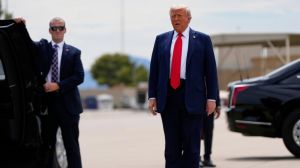India’s dialogue with US `worries’ China
NEW DELHI, MARCH 2: India’s ambassador to China Vijay Nambiar is believed to have asked Beijing to explain why it is co...

NEW DELHI, MARCH 2: India’s ambassador to China Vijay Nambiar is believed to have asked Beijing to explain why it is concerned that India’s dialogue with the US is an implicit recognition of New Delhi’s nuclear power status.
Nambiar is believed to have taken the unusual initiative by seeking a meeting with the Chinese foreign office some days ago, after reports in the Western press quoted Chinese officials in Washington saying that they were concerned that the US may be letting India off the hook on the nuclear issue.
Evidently, the Chinese officials told êIThe Washington Post that the US, after its long and intensive “strategic dialogue” with India over the last couple of years had effectively moved away from its stated position under Security Council resolution no 1172 — which, post-Pokharan, had told India to desist from pursuing its nuclear weapons and missile programmes.
It is believed that the Chinese, subsequently, formally raised similar concerns with the US Deputy Secretary of State Strobe Talbott — the man in charge of the dialogue with India — when he visited Beijing a couple of weeks ago, and asked him if the US was now effectively accepting an Indian minimum nuclear deterrent.
Interestingly, in their meeting with Nambiar, the Chinese rubbished the western newspaper reports, leading some Chinawatchers here to conclude that Beijing didn’t want to accept — certainly not to the Indian ambassador — that New Delhi could be emerging from its long, international isolation after its 1998 nuclear tests.
China’s perceived insecurity over the implicit acknowledgement of India as a nuclear weapons power, analysts add, throws next week’s first bilateral “security dialogue” between Beijing and New Delhi into a whole, new interesting framework.
Led by Rakesh Sood, joint secretary responsible for disarmament issues in the Ministry of External Affairs, the dialogue round will cover the gamut of security issues, both regional and international.
China and India moreover are members of security organisations such as the Asean Regional Forum as well as the Conference of Disarmament in Geneva and each side, especially on the eve of US President Clinton’s visit to India, are keen to get the measure of each other.
China hands in the capital point out that Beijing has also told the US that Clinton mustn’t skip Pakistan during his sub-continental trip, confirming the view here that it may be, for the first time, getting somewhat concerned about India’s role in the region.
Analysts point out that if the US was willing to substantially engage with India, the rest of the nuclear weapon powers couldn’t be far behind. France, for example, has openly displayed its keenness to enter into nuclear-related deals with India as has Russia, while Britain, a close ally of the US, would not be averse to following Washington’s mind. “Such a situation would essentially leave China out of the loop,” one analyst said.
Ministry officials were not willing to say whether Sood and his team would bring up China’s concerns with their counterparts in Beijing next week, but clearly, the matter cannot be ruled out.
Certainly, the analysts felt that China’s publicly stated heartburn seems to have enhanced the possibility of a truly interesting dialogue session between the two sides next week.
Photos





- 01
- 02
- 03
- 04
- 05


























